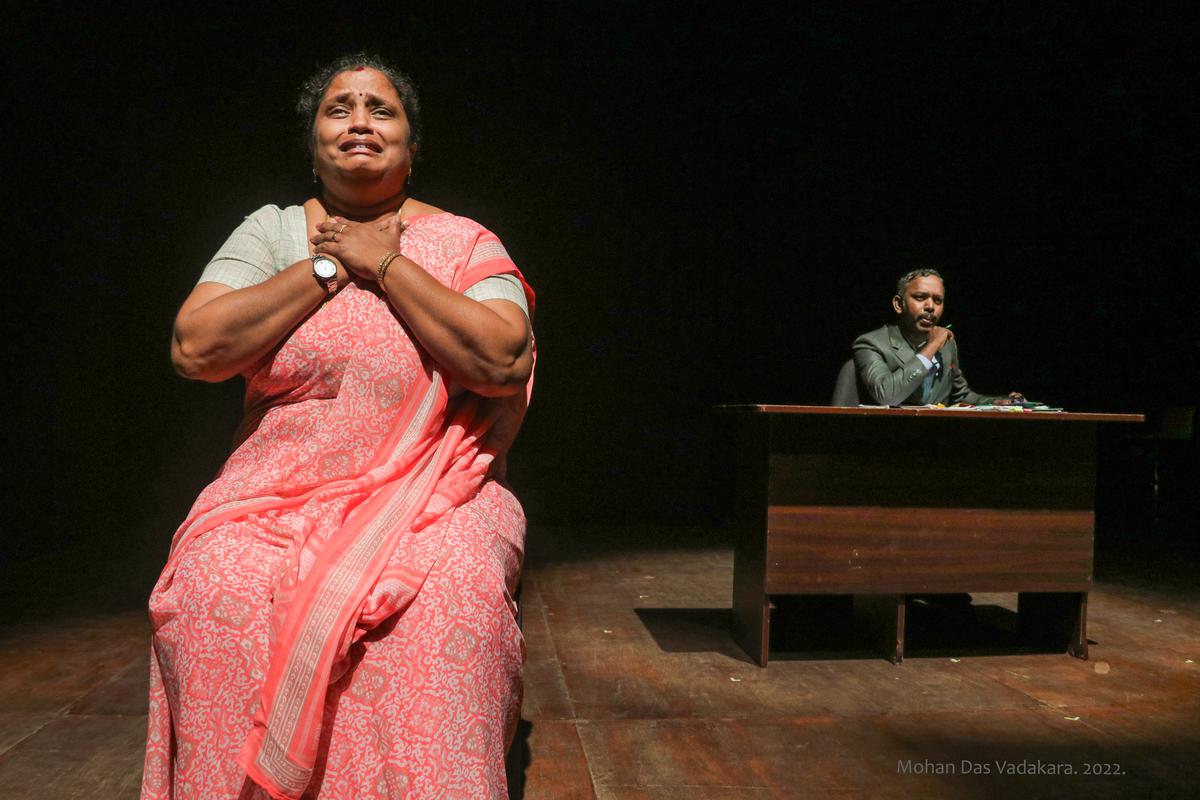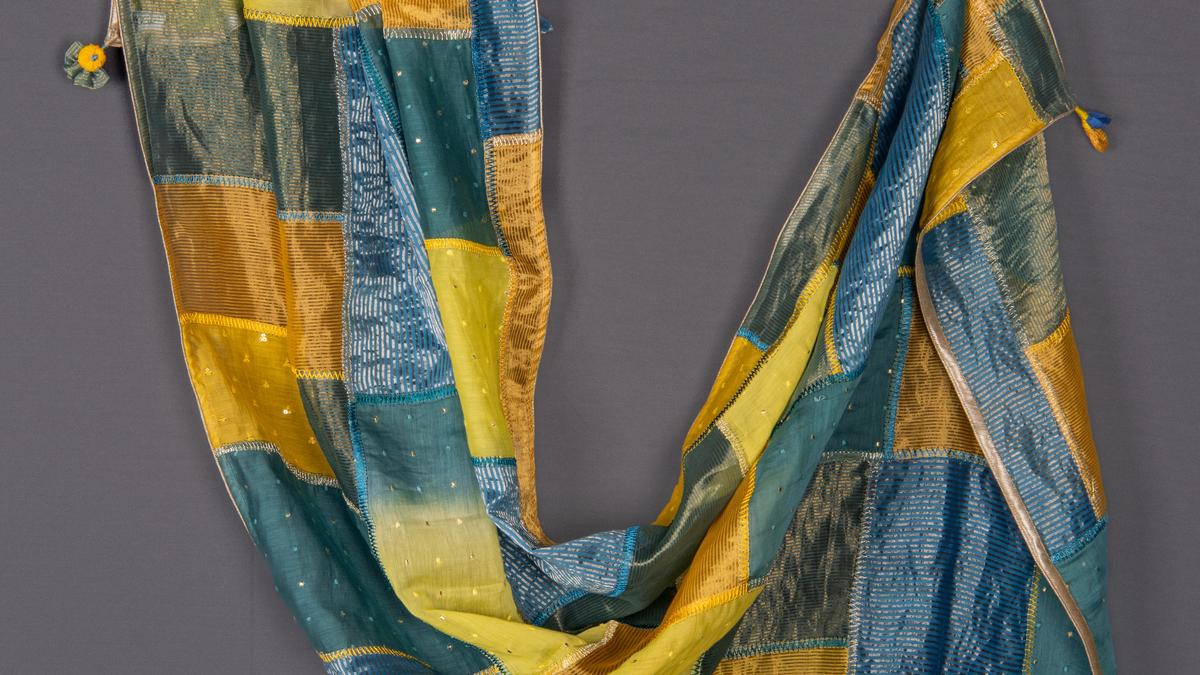Centrestage, under the spotlight, sits a corpse.
It is not shrouded in white cloth, though. Instead, there are rings and gold chains, a suave pair of sunglasses and an occasionally toothy grin. Unusual? Yes. Funny? The Saturday afternoon audience certainly thought so, given that they roared with laughter for the entire 10 minutes of Sethum Jaichidichu Meesai, staged at the recently concluded Short + Sweet South India 2022.
The 10-minute play traces an exasperated son’s relationship with his self-centered father through a non-linear monologue in Tamil, hours after the father’s passing. It went on to win Best Production, Best Script and Best Actor (Male) awards at the festival. Similarly, Jayachandran of Tamil group Kael Theatre won Best Director, for the hard-hitting, impeccably timed, Iruvar, an examination of the P Jayaraj-Bennix custodial death case.
A still from Sethum Jaichidichu Meesai at the recently concluded Short + Sweet Theatre Festival 2022
| Photo Credit:
MOHAN DAS VADAKARA
Case in point: contemporary Tamil theatre in Chennai is having its moment in the sun.
It is undergoing a makeover in the hands of young theatre groups and individuals, all of whom are experimenting with form, themes, dialect and dramaturgy, while keeping the sentiment of the language at its core. By moving away from traditional and folk formats to embrace contemporary themes, it is also reaching out to a younger, urban audience.
Vijay Babu and his 69-year-old father Hari Babu, a former National-level boxing champion, who play the son and father in Sethum Jeichidichu… respectively, have been gathering fans ever since their first run. Vijay, who also wrote the script with first-time director Thiruvia Sankar, has not performed much outside of the Short + Sweet festival over the years. He calls himself a “run-of-the-mill guy” who found himself through theatre in 2015. His father, Hari, on the other hand has no stage experience whatsoever.
They are among the burgeoning crop of promising directors, writers and actors who are rewriting how the audience perceives the medium. “With avenues like Short + Sweet, there are greater opportunities for people like us to perform. There is space to evolve. I am still in the learning stage,” says Vijay.

A still from Iruvar
| Photo Credit:
MOHAN DAS VADAKARA
Role models stand tall
“The first time we saw naveena natakam was by Na Muthuswamy sir. He brought in the novel idea that Tamil theatre can be done in a contemporary way,” says B Charles, light designer and member of Chennai Art Theatre who is also one of the founders of the black box, Medai – The Stage, in Alwarpet. It was matched by veterans like Prasanna Ramasamy and A Mangai who looked at radical, and important themes within the milieu of regional theatre. He adds, “Muruga Bhoopathy and groups like Perch and Koothu Pattarai took it to an international level.” The current crop, or atleast most of the directors and writers who experiment, come from similar schools that boast years of experience on stage.
Vetri of Theatre Akku which formed in 2017 comes from Koumarane Valavane’s Puducherry-based Indianostrum Theatre. “When I came to Chennai from a strict schedule at Indianostrum, I felt empty. I started observing other groups’ rehearsals: both established and amateur,” he says. Their first play, Adavu, derives from a therukoothu artist’s life, an inspiration that struck Vetri while observing the work of Purisai Therukoothu helmed by Kannappa Thambiran in Purisai. It went on to play 26 shows.
For the ages
Traditional tamil theatre has deep roots in the city. The late 19th and early 20th Century was the period of great growth — from folk arts groups becoming organised troupes; to the rise of sabha plays that predominantly ran religious and epic plays based on The Mahabharatha and The Ramayana, and of doyens like Sankaradas Swamigal, Pammal Sambandha Mudaliar and more recently S Murugabhoopathy, Na Muthuswamy.
As a contemporary group, Akku does not follow the traditional tenets of devising a performance. What starts as a discussion among actors, are improvised, to form a loose structure. Komaligal ( a four-play anthology in Tamil that looks at sexual oppression and abuse of women by drawing inferences for real incidents) , which has been touring since 2020, is testament to this process.
“Thanks to the digital age, a certain sense of expectation is now applied to theatre as well. We have to match these expectations. Only then can we get a regular audience,” says Vetri.
Being contemporary is not only restricted to the content. The way in which it is executed matters. Collaborations with other existing groups would also lead to the creation of new formats, says Vetri. “Art is meant to be democratic. If theatre can reach the people, nothing like it. This would even mean putting up private shows for a group of 50 or 75 people in a community hall,” says Vetri. Komaligal has travelled to schools, public spaces, orphanages, detention centres and other unconventional stages, to reach audiences who don’t have access to theatre.
Accessible spaces
While curating, for every six plays at Medai, Charles makes sure that at least two to three plays are in Tamil. “The short plays usually come from local writers, and definitely there is a greater connection with the audience as well,” says Charles. This year, the sheer number of new Tamil plays hosted in the space was more. “We hosted around 12 Tamil plays in Medai, all of which were helmed by young writers and directors,” he adds.
The fact that mainstream stages in the city are not accessible is partly responsible for the birth of Idam, a new performance/workshop space by Theatre Akku, admits Vetri. From a commercial point of view, renting a mainstream stage, like say, Egmore Museum Theatre is unthinkable for an up and coming group, says Vetri. “Even when we sell tickets, we try to keep it economical and accessible. So, we might not meet the profit margin all the time.”
Idam, which is yet to formally launch, is a small, theatrical space. With a bookshelf, murals and seats that fold into the walls, the space is meant for any form of workshops, performances and even rehearsals.
A still from the play Dhik Dhik
| Photo Credit:
PRADEEP R
New audiences are looking for renewed visual experiences, a deviation from the sabha culture that relied heavily on the written word. In the digital age, the production quality of a play invariably comes under scrutiny: from acting, sets, lights to costumes, everything is under the scanner. “Even if you don’t have an exceptional set, something new should be on offer,” says Vetri, adding that it’s important to attract new audiences.
“Apart from the already existing theatre community in the city, audiences are now looking for good Tamil contemporary plays. In 100 people, at least 80 people come for the content and the language,” says Charles. The idea is to break into the niche, and grow the community, rather than looking at it as a sub community. “Even within Tamil theatre, there seems to be a gap between traditional or folk forms and contemporary. If these two worlds can combine and bring out a new style, it will be very interesting to see,” says Vijay.






